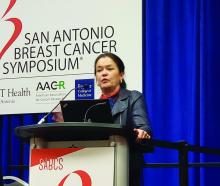SAN ANTONIO – Adding pertuzumab to trastuzumab and chemotherapy after surgery for HER2-positive early breast cancer continued to show a slight, but statistically nonsignificant overall survival benefit, compared with placebo, at a preplanned 6-year interim analysis of the phase 3 APHINITY trial.
Invasive disease-free survival (IDFS) was significantly improved with pertuzumab at this second interim analysis, and node-positive patients continued to derive the greatest benefit, as was the case in the primary analysis reported in the New England Journal of Medicine in 2017, Martine Piccart, MD, PhD, reported at the San Antonio Breast Cancer Symposium.
At a median of 74.1 months of follow-up, overall survival (OS) was 94.8% in 2,400 patients in the pertuzumab arm, compared with 93.9% in 2,405 patients in the placebo arm (hazard ratio, 0.85), said Dr. Piccart of Institut Jules Bordet, Brussels.
She noted that a “very stringent” P value of.0012 was required for statistical significance in this interim OS analysis.
IDFS rates at follow-up were 90.6% vs. 87.8% in the intent-to-treat population, a difference caused mainly by a reduction in distant and loco-regional recurrence, she noted.
“[That translates] to a 2.8% absolute improvement with pertuzumab at 6 years,” she said, adding that the risk of both distant and loco-regional recurrences was reduced with pertuzumab. “The rate of [central nervous system] metastases, contralateral invasive breast cancers, and death without a prior event – not different between the two treatment groups.”
In the node-positive cohort, the 6-year IDFS rates were 87.9% vs. 83.4% with pertuzumab vs. placebo (4.5% absolute benefit; HR, 0.72), showing a clear benefit.
“In contrast, no treatment effect is detected in the node-negative population [95.0% and 94.9%, respectively; HR, 1.02],” she said.
Importantly, the clinical benefits were seen regardless of hormone receptor status (HRs, 0.73 and 0.83 for hormone receptor–positive and –negative disease, respectively), she said, noting that this finding differs from the 3-year analysis, which suggested an enhanced benefit only in the hormone receptor–negative cohort.
“These [hormone receptor–negative] patients still benefit from pertuzumab ... but interestingly, now the curves are diverging in the hormone receptor–positive population, and there is a benefit emerging,” she said.
An updated descriptive analysis of cardiac safety was also performed, and no new safety concerns emerged, Dr. Piccart said.
“What is important to remember is the rate of severe cardiac events is below 1% in both groups (0.8% and 0.3% with pertuzumab and placebo),” she said.
APHINITY is a randomized, multicenter, double-blind, placebo-controlled trial which previously demonstrated that pertuzumab added to standard chemotherapy plus 1 year of trastuzumab in operable HER2-positive breast cancer was associated with modest but statistically significant improvement in IDFS, compared with placebo and chemotherapy plus trastuzumab (HR, 0.81; P = .04).
The effect was more pronounced in node-negative patients (HR, 0.77) and hormone receptor–negative patients (HR, 0.76).
Patients with node-positive or high-risk node-negative, HER2-positive, operable early breast cancer were enrolled between November 2011 and August 2013, and the primary analysis was conducted at 45.4 months of follow-up. Based on those findings, pertuzumab in combination with trastuzumab was approved for high-risk early HER2-positive breast cancer patients.
The first interim OS analysis was conducted at that time, and no significant treatment effect was observed, Dr. Piccart said.
The 6-year findings demonstrate that the small OS benefit and the statistically significant IDFS benefit with pertuzumab in this setting is maintained, with the node-positive population deriving the greatest benefit.
“Further follow-up will be very important to determine whether there is a survival benefit associated with pertuzumab administration in early HER2-positive breast cancer,” she said, noting that a calendar-driven third interim OS analysis is planned in 2.5 years.
The APHINITY trial is funded by Roche. Dr. Piccart reported receiving consulting fees from Roche and research funding to her institution from Roche and several other companies. She also is a consultant for the advisory boards of AstraZeneca, Camel-IDS, Crescendo Biologics, Debiopharm, G1 Therapeutics, Huya Bioscience International, and Immunomedics.
SOURCE: Piccart M et al. SABCS 2019, Abstract GS1-04.


